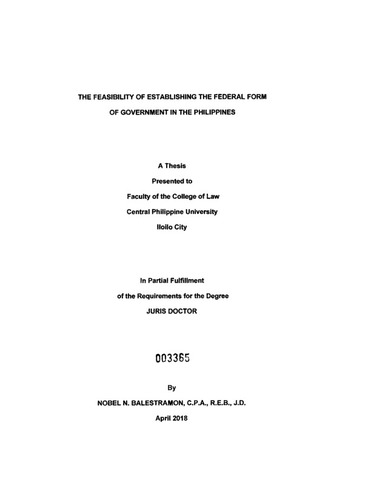Ipakita ang simpleng tala ng item
The feasibility of establishing the federal form of government in the Philippines
| dc.contributor.adviser | Alibogha, Salex E. | |
| dc.contributor.author | Balestramon, Nobel N. | |
| dc.coverage.spatial | Philippines | en_US |
| dc.coverage.spatial | Germany | en_US |
| dc.coverage.spatial | Australia | en_US |
| dc.coverage.spatial | United States | en_US |
| dc.date.accessioned | 2021-06-21T01:53:05Z | |
| dc.date.available | 2021-06-21T01:53:05Z | |
| dc.date.issued | 2018 | |
| dc.identifier.citation | Balestramon, N. N. (2018). The feasibility of establishing the federal form of government in the Philippines (Unpublished postgraduate thesis). Central Philippine University, Jaro, Iloilo City. | en_US |
| dc.identifier.uri | https://hdl.handle.net/20.500.12852/1046 | |
| dc.description | Abstract only | en_US |
| dc.description.abstract | This research aimed to determine the applicability of federalism in the Philippines. To achieve this objective, the researcher chose three model countries, namely, Australia, Germany and the United States and reviewed the characteristics of each federal structure and derived the strengths, weaknesses, opportunities and threats in a federal government. Federalism is a form of government where administrative powers are shared between the national government and its states. Federal states, in the Philippine context, may come in the form of regions or group of provinces. Unlike in a Unitarian government, these states could act independently on certain areas of governance such as charting their own economic development agenda, managing their taxes, designing their infrastructure program, issuing licenses, and administering health, education and social service programs. The national government, would retain jurisdiction over all things of national interest, including foreign policy, defense, and managing the country’s finances, and others. On the other hand, federalism could promote divisiveness, uneven distribution of wealth, bureaucracy, and political dynasties. The researcher‘s assessment showed that a semi-presidential federal system is suitable to the Philippines. However, before we shift to federalism, further study of the proposals shall be conducted to come up with a federal system that will reflect Filipino ideologies and an instrument for the betterment of the whole country. | en_US |
| dc.format.extent | vi, 64 leaves | en_US |
| dc.language.iso | en | en_US |
| dc.rights | Attribution-NonCommercial-NoDerivs 3.0 Philippines | * |
| dc.rights.uri | http://creativecommons.org/licenses/by-nc-nd/3.0/ph/ | * |
| dc.subject.ddc | Law Library 340.72 B195 | en_US |
| dc.subject.lcsh | Politics and government | en_US |
| dc.subject.lcsh | Philippines | en_US |
| dc.subject.lcsh | Federal government | en_US |
| dc.subject.lcsh | Australia | en_US |
| dc.subject.lcsh | Germany | en_US |
| dc.subject.lcsh | United States | en_US |
| dc.title | The feasibility of establishing the federal form of government in the Philippines | en_US |
| dc.type | Thesis | en_US |
| dc.description.bibliographicalreferences | Includes bibliographical references | en_US |
| dc.contributor.chair | Bedona, Zacarias D. Jr. | |
| dc.contributor.department | College of Law | en_US |
| dc.description.degree | Juris Doctor | en_US |
Mga file sa item na ito
Lumilitaw ang item na ito sa mga sumusunod na (mga) Koleksyon
-
Juris Doctor [144]



